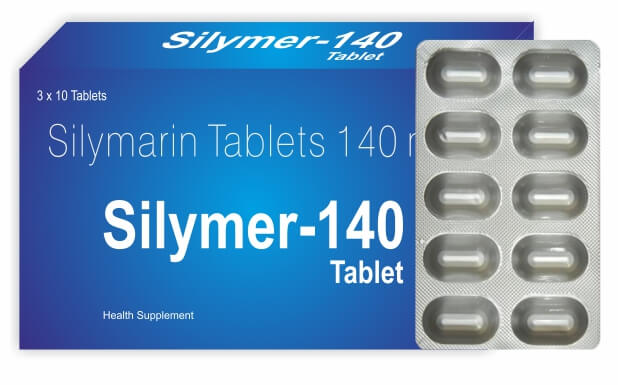Silymarin is used to treat hepatic dysfunction. It can also be used as supplementary medication for treating chronic inflammatory diseases such as cirrhosis liver toxicity and liver damage.Side effects that are associated with using this medication are rare. Some very minor allergic reactions include diarrhea, bloated warmth , skin rash and itchiness.
Indications & Usage
● Used to protect liver cells (and other cells in the body and brain) from toxins.
● Silymarin stimulates liver cell protein synthesis and decreases the oxidation of glutathione.
● Beneficial in a number of diseases involving liver disease
● Powerful liver de- toxifying agent
● Powerful antioxidant
Pharmacology
Milk thistle is an herbal remedy derived from the milk thistle plant, also known as Silybum marianum. Extract contains high amount of silymarin (between 65–80%) that has been concentrated from the milk thistle plant. The silymarin extracted from milk thistle is known to have antioxidant, antiviral and anti-inflammatory properties. It’s regularly used as a complementary therapy by people who have liver damage due to conditions like alcoholic liver disease, non-alcoholic fatty liver disease, hepatitis and even liver cancer. Milk thistle is thought to reduce damage to the liver caused by free radicals, which are produced when your liver metabolizes toxic substances. Its anti-inflammatory and antioxidant properties mean that it is possibly neuroprotective and could help prevent the decline in brain function you experience as you age. Studies have also seen that milk thistle may be able to reduce the number of amyloid plaques in the brains of animals with Alzheimer's disease.
Pharmacokinetics:
Silymarin works through several different mechanisms.
● Rapidly absorbed and eliminated
● Reached peak plasma levels within 2 h
● Cmax of 9.0±3.0 μg/ml for unconjugated drug and 93.4±16.7 μg/ml for total (free + unconjugated drug)
● Short half-lives (1-3 and 3-8 h for free and conjugated
● Secreted in bile
Side Effects
● Abdominal bloating/pain
● Allergic reactions
● Diarrhea
● Gas
● Indigestion
● Itching
● Loss of appetite
● Nausea
● Rash
● Severe allergic reaction (anaphylaxis)
Contraindications
● Not to be used in patient having allergy to any ragweed, chrysanthemums, marigolds, chamomile, yarrow, or daisies.
● Consult your doctor before using in pregnancy or breast feeding.
